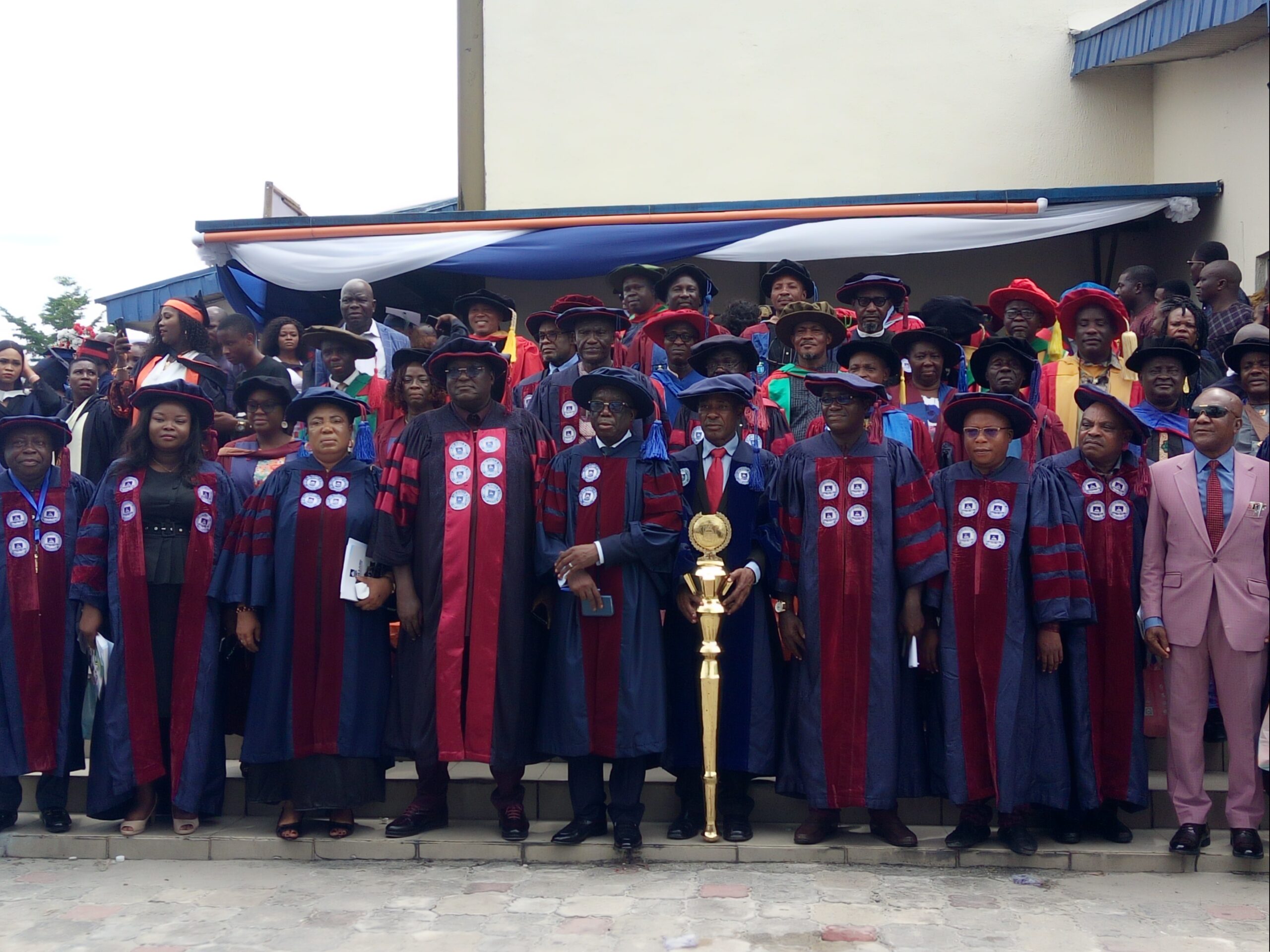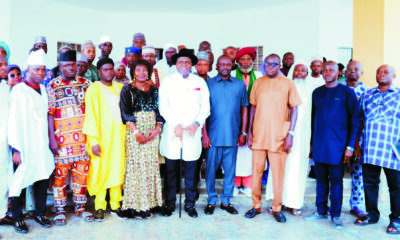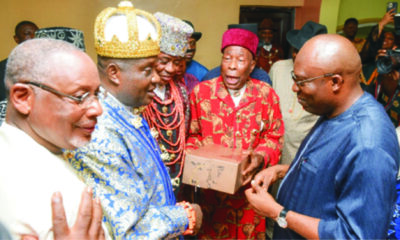Education
360 Indigent N’Delta Pupils Get Shell Special Scholarship
Five years after the launch of the Cradle-To-Career scholarship scheme in 2010 for hard-to-reach but brilliant children in remote public primary schools in the Niger Delta states, the Shell Petroleum Development Company of Nigeria (SPDC), has now increased the number of beneficiaries of the special education development programme in three core pilot states of Bayelsa, Delta and Rivers, to 360 indigent pupils.
Inducting 60 new beneficiaries into the fully funded secondary school scholarship scheme at Brookstone Secondary School, Rukpokwu, Obio/Akpor Local Government Area, Rivers State, the company said that the pupils, who come from public primary schools in typically hard-to-access Niger Delta communities, have been enrolled into four of the best secondary schools in the country for quality education.
The pupils, who passed required tests to undertake rigorous secondary education at Jephthah Comprehensive College, Brookstone Secondary School, Bloombreed High School, and Archdeacon Brown Education Centre, all in Port Harcourt, were admitted after a painstaking and transparent academic selection process conducted under the strict supervision of the various stakeholders, including the state Ministries of Education.
Speaking at the induction ceremony, Managing Director, SPDC and Country Chair, Shell Companies in Nigeria (SCiN), Osagie Okunbor, assured the 60 pupils that the company would fund their educational career up till university level, if they maintained top-of-the-class academic records, adding that this was one of the many pillars upon which Shell’s education support initiatives hinge.
Represented by the General Manager, External Relations, Igo Weli, the managing director, stressed that, “The C2C approach marks a significant improvement in our portfolio of scholarship schemes,” pointing out that, “It is designed to bridge educational inequalities resulting from geographic and socio-economic differences.”
“SPDC and its joint venture partners are proud of the achievements of the scheme, which is in line with UNESCO’s ‘Education for All’ goal, has received local and international accolades,” he stated.
He added that, “SCiN have a long history of supporting education through scholarships and other initiatives with about 1,080 secondary school and 850 tertiary schlarships annually”, emphasising that, “In 2014 alone, the SPDC joint venture and Shell Nigeria Exploration and Production Company (SNEPCo), invested some $14.8 million in scholarships and other education programmes.”
In his remarks on behalf of the Rivers State Government, Permanent Secretary, Ministry of Education, Michael West, commended SPDC and its joint venture partners for the life-transforming programme, and charged other private companies to emulate the example.
According to him, “Any organisation that invests in educational development is to be commended. With programmes like this, I believe we can take education to a new height.”
In their goodwill messages, representatives of Bayelsa and Delta State governments, lauded the company for complimenting the efforts of government in promoting quality education and building capacity to bridge the yawning gap in human capital development in the catchment states, and challenged other multinational oil and gas companies to emulate the Shell initiative in improving education in the Niger Delta.
In an interview, a guardian to one of the beneficiaries, Mrs. Maureen Benstowe, said: “The C2C scholarship scheme is definitely transforming lives. I have been carrying the burden of educating my ward alone until I heard about this programme. Today, SPDC has lifted my burden and wiped away my tears.”
Another parent, Mrs Anne Ajayi, said: “I’m so grateful to SPDC for this rare opportunity. The expensive school my child is today, I ordinarily would not have been able to afford it. I see my dream and that of my child become reality because of the wisdom of this company.”
A beneficiary, Yamiye Godstime, said, “SPDC has made my dream of becoming an engineer possible, and I hope to graduate and play my role in contributing to the development of my community, the nation and humanity.”
Education
Former VC Advocates Drug Test For University Lecturers

Prof. Muhammad AbdulAziz, the immediate past Vice Chancellor of Abubakar Tafawa Balewa University (ATBU), Bauchi state, has advocated drug tests for lecturers to sanitise the university system.
Mr AbdulAziz stated this in a valedictory speech to the Senate of the University at a handing-over ceremony to his successor, Prof. Sani Kunya, the new acting Vice Chancellor of the institution.
While commending the decision by the Federal Ministry of Education to introduce drug tests for students seeking admission to all universities, he said such tests should be extended to lecturers.
According to him, it would further sanitise the university system and promote sanctity and academic excellence.
“We have discussed with the Federal Ministry of Education and they want to introduce to all universities that before any student would be registered in the universities, he or she must undergo drug tests.
“If students should undergo drug tests, I believe that even some of us, the lecturers, need to undergo the same test so that we know our status.
“We also have to volunteer ourselves to have this test done on us because we have to sanitise the university.
“If the students are to be subjected to drug tests to determine their mental health status, nothing is wrong if the lecturers too are subjected to the same test.
That is the only way to check excesses in the university system,” he said.
Mr AbdulAziz said the modest achievements recorded during his tenure were in the areas of infrastructural development, academic content development and community services.
He said the achievements recorded could not have been made possible without the support of all stakeholders in the system.
He appreciated the federal government for the support rendered to the University through the Federal Ministry of Education and its various agencies like the National Universities Commission and the Tertiary Education Trust Fund.
Read Also:Students to undertake drug test before admission UniAbuja
Also speaking, the new acting VC of the university expressed gratitude to the Senate for finding him worthy of the honour and to the federal government for his confirmation.
“I want to assure you that I will justify the confidence reposed in me by not disappointing you all.
Education
Don Seeks 20%Increased Budget Allocation To Education

A Professor of Economics in the Faculty of Social Sciences University of Port Harcourt, Rivers State, Prof Willie J. Okowa has called on government at all levels to increase her Education sectorial budgetary allocation to twenty percent of their annual budget , saying that such efforts will improve the development of education in the country.
Okowa said each government wether local, state or federal governments should devote an increased proportion of her annual budget to education such that in the next five to ten years , so that we can see at least 20 percent of her budget to the education sector.
He made this call while presenting the 42nd convocation lectures at the just concluded Iaue convocation ceremonies held at the university auditorium in port harcourt, recently.
He posisted that the economy has a nexus with sustainable higher education to the effect that a robust economy plays a key role in the sustainability of higher .education , while a sustainable higher education plays a supportive economic growth and development
“On the hand,a failing economy can hardly support a sustainable higher education”.
According to him ,a growing economy easily provides the finances to fund sustainable higher education while a education provides the relevant skills and the manpower needs required to propel economic growth and development,”of course, The Inadequate provision of higher educational facilities will fail to the manpower needs required by the economy to support its growth and development”
“The ability of an economy to adquately find higher education also depends on the rate of the population ,the higher the rate of growth of population, the more the number of the people that require higher education .Hence ,a rapid population growth puts more pressure on the ability of the economy to adquately fund higher education, irrespective of its performance.”
“Population growth , economic growth and the adequate funding of higher education are therefore intricately interlinked.The adequacy of the funds that an economy provides to finance higher education also depends on how well the managers of our education institutions manage such funds.
If people who lack character , integrity and merit are appointed to helms of affairs institutions,then funds can hardly be adequate .on the other hands ,if people of character, integrity and merit are given such appointments ,then the outcome will be much better” he stated.
The erudite scholar opined that Nigerian universities and colleges are also passing through strange times and outlined outdated laboratories , inadequate classrooms, adding that many students involved in drugs and prostitution.
By: Akujobi Amadi
Education
Bauchi Govt Threatens To Revoke Scholarship Of Unserious Students

The Bauchi State government has cautioned that it will cease payment of external exam fees for Senior Secondary Three, SS3 students found skipping classes.
Commissioner for Education, Jamila Dahiru gave the warning in Bauchi during her school resumption inspection and monitoring visits to some schools on Wednesday.
The Tide’s source recalls that Governor Bala Mohammed earlier allocated N396.9 million for the 2023/2024 external exams of 14,170 students in public schools.
The external examinations paid for included the West African Examination Council, WAEC, the National Examination Council l, NECO, National Board for Arabic and Islamic Studies (NBAIS) and the Joint Admissions and Matriculation Board, JAMB.
However, the Commissioner, who was furious with the low level of attendance of especially the SS3 students in some schools, recounted how she met less than 20 percent of the SS3 students who were around when she visited a particular school.
She stressed the need for students to return to class and prepare diligently, threatening to revoke scholarships for ‘unserious ones.’
Her words: “We just realised that most of these students, after being taught from JSS1 to SS3 and with Gov. Bala Mohammed paying for their external exams, and as soon as they were done with their mock exams, they left school and won’t return until the first day of their external exams.
“It is sad to acknowledge that we are not responsible as parents because I want to believe that they have parents who are seeing them attending schools simply because they are getting ready to just write their external examinations.
“We want to make them come back to class, we want to emphasize that we are investing in the right people because it is just telling us that it is the government that bothers about their education while they don’t care and probably their parents that are allowing them to stay at home also do not care.
-
Business5 days ago
Boat Mishap: CILT Advocates Safety Culture On Waterways …Claims 300 Nigerians In 2023
-

 Niger Delta5 days ago
Niger Delta5 days agoNCDMB Boss Lauds SNEPCO, Others Over Project Execution
-
News17 hours ago
NANS Threatens Nationwide Protest Over Fuel Scarcity
-

 Business5 days ago
Business5 days agoAFEX Launches Impact Report On Food Security
-
Oil & Energy5 days ago
FG Explains Sulphur Content Review In Diesel Production
-

 News17 hours ago
News17 hours agoEx-CBN Director Admits Collecting $600,000 Bribe For Emefiele
-

 News5 days ago
News5 days agoNGF Advocates Safer Transportation Of Petroleum Products
-

 Maritime5 days ago
Maritime5 days agoDrydock To Complete LAGFERRY Maintenance, Aug -Commissioner

